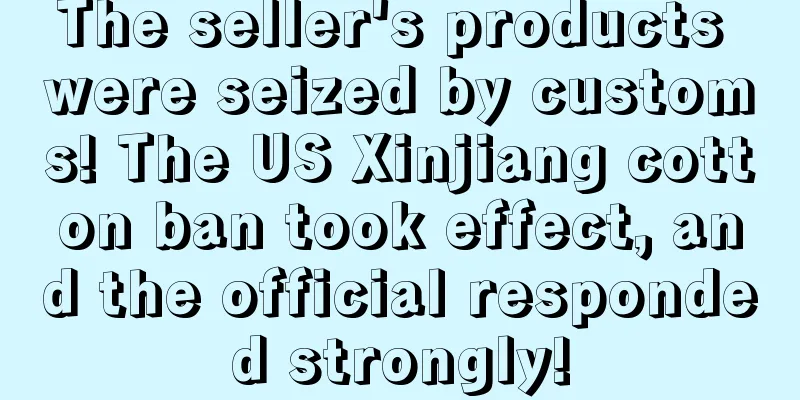|
▶ Video account attention cross-border navigation It is learned that the U.S. Uyghur Forced Labor Prevention Act (UFLPA) officially came into effect on June 21. According to the bill, the U.S. Customs will impose an import ban on goods from China's Xinjiang region and conduct strict inspections on all polysilicon, cotton, and tomato-related products. Prior to this, it was mentioned in the article "The US Customs Ban is about to take effect! Banning all Xinjiang cotton products?" that many freight forwarders have issued notices that the US Customs will soon conduct strict inspections of textile goods, stating that once customs inspects Xinjiang cotton, it will inspect and detain the goods. After the bill officially came into effect a few days ago, related products manufactured by Chinese companies have been seized by customs. The US Xinjiang cotton ban takes effect, and Skechers products are unreasonably seized! It is learned that recently, the official website of the U.S. Customs CBP issued an announcement stating that the Uyghur Forced Labor Prevention Act signed by Biden in December last year will take effect on June 21 this year and will be implemented for 8 years, or until the U.S. President announces its end. CBP also stated that the U.S. Customs will have the right to seize any products from Xinjiang and then provide detention notices to the merchants of the seized products. ▲ The picture comes from the CBP official website Based on this, the U.S. Customs recently seized some products of the American sports brand Skechers produced in China and shipped to the United States based on the "Uyghur Forced Labor Prevention Act". The reason for the seizure was that these Skechers products were produced by China's Dongguan Oasis Shoe Co., Ltd., and Oasis Shoe Co., Ltd. employed Uyghur employees from Xinjiang. Since the products were seized, Skechers also commissioned relevant partners to conduct an investigation. The verification results confirmed that there was no evidence that Oasis Shoes and other companies that employed Uyghur and other ethnic minority employees had racial discrimination against ethnic minority employees, and there was no evidence that Xinjiang employees were prohibited from returning to Xinjiang. Based on the above verification results, Skechers is preparing to submit a complaint to the U.S. Customs , requesting that the U.S. Customs remove Oasis Shoes from the blacklist and release Skechers' products. It is learned that Skechers is present in more than 150 countries and regions and is the second largest footwear brand in the U.S. market after Nike. Data shows that as of May 2021, Skechers has become the best-selling men's and women's shoe brand on Amazon's e-commerce platform (Amazon). It can be seen from this that the US ban on Xinjiang cotton has affected more than just Chinese clothing companies. The apparel industry has been greatly affected, and non-Xinjiang cotton products need to provide proof! Relevant reports show that China's textile industry is the largest exporter of leading global brands. About 20% of the world's cotton comes from China, of which 89% comes from Xinjiang. According to the National Bureau of Statistics, the total cotton output in Xinjiang, China in 2021 was 5.129 million tons, accounting for 89.5% of the country's cotton output, ranking first in the country for 25 consecutive years. Due to the high quality of Xinjiang cotton, many world-famous brands have signed long-term contracts with local companies. Data show that in the first five months of 2022, the total value of Xinjiang's foreign trade imports and exports was 67.41 billion yuan, a year-on-year increase of 30.9%. According to feedback from sellers, since the United States signed the Uyghur Forced Labor Prevention Act, some brands in Europe and Japan have stopped or reduced the use of Xinjiang cotton. After the US ban came into effect, it also caused an uproar in the cross-border circle. Many sellers were worried that the bill would have a great impact on sellers in the clothing category. ▲ The picture comes from Zhiwubuyan However, some sellers also said that in fact, as long as the material is changed to something other than cotton when making the invoice, it will not be affected much. ▲ The picture comes from Zhiwubuyan In addition, for textile goods that are strictly inspected by the U.S. Customs, cotton products that are not made of Xinjiang cotton must also provide the following information:- The certificate of origin must indicate the customer's purchase order information and the address of the factory where the goods are produced.
- The seller self-assured that the exported product does not contain cotton from the region.
- Cotton raw silk purchase order and invoice.
- Cotton thread purchase order and invoice.
- Cotton purchase order and invoice.
- Any additional documentation required to comply with U.S. Customs orders.
However, we also learned that under this ban by the US government, it is not only China's clothing industry that is affected, but the entire clothing industry, including the domestic clothing industry in the United States, faces huge risks. According to the American Workers' Rights Association, American brands and retailers import more than 1.5 billion pieces of clothing made from Xinjiang cotton each year, involving more than $20 billion. Some analysts pointed out that after the implementation of the bill, American retailers and manufacturers will fall into chaos and the US clothing industry will be hit hard. Liv Simpliciano of Fashion Revolution also said that Xinjiang cotton is ubiquitous in the supply chain: "At the ginning stage [when the fiber is separated from the seeds], cotton from different locations is mixed together and the origin cannot be traced." Fortune magazine predicts that in the coming months the United States will find that the supply chain problems it is trying to solve will face new challenges due to this bill targeting Xinjiang. The "Lies Act" will eventually be exposed, and the Ministry of Commerce has responded strongly! It is understood that on June 21, in response to the U.S.'s comprehensive ban on Xinjiang-related products, China's Ministry of Commerce issued a strong response: Currently in the process of cotton planting in Xinjiang, the comprehensive mechanization level in most areas exceeds 98%. The so-called "forced labor" in Xinjiang is totally inconsistent with the facts. The bill implemented by the United States is a typical act of economic coercion, which seriously damages the vital interests of Chinese and American companies and consumers, is not conducive to the stability of the global industrial chain and supply chain, is not conducive to the easing of global inflation, and is not conducive to the recovery of the world economy. China firmly opposes this. ▲ Picture from Xinhua News Agency Currently, the United States is experiencing the strongest inflation in the past 40 years. Data shows that compared with previous years, the average American family needs to spend an additional $460 per month. Many sellers believe that if the US government insists on carrying out the bill to the end, the loss of China's high-quality and low-cost Xinjiang cotton and related products such as polysilicon will only be detrimental to future US consumer inflation , and the US "Lies Bill" will eventually be exposed. Finally, no matter how much the United States wants to boycott Xinjiang cotton, I believe that Chinese sellers will insist on defending the bottom line of national interests and support Xinjiang cotton! |










